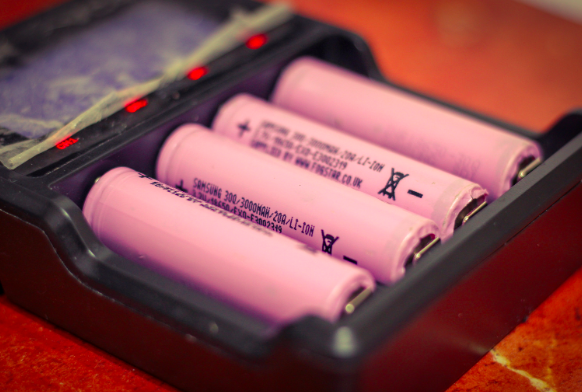Last Updated on November 25, 2022 by mdmtool
Batteries are devices that store energy chemically and convert it to electrical power. Batteries can be divided into two main types. These are non rechargeable and rechargeable batteries. Rechargeable batteries can be used over and over again. They are made of materials that can be charged and discharged many times without damaging the battery. They have different uses and applications.
What Are Non-Rechargeable Batteries

Non-rechargeable batteries are the most common type of battery used in household and industrial applications. A non-rechargeable battery cannot be recharged once it has been depleted and must be replaced. The majority of non-rechargeable batteries are made from alkaline or zinc-carbon chemistries.
What Are Rechargeable Batteries

Rechargeable batteries are a type of battery that can be reused multiple times after being charged. Unlike disposable batteries, which are designed to be used once and then thrown away, rechargeable batteries can be charged and used repeatedly.
Difference Between Rechargeable And Non-Rechargeable Batteries

There are several critical differences between rechargeable and non-rechargeable batteries.
- Energy consumption: Rechargeable batteries tend to have a much higher energy density than non-rechargeable batteries. This means they can store more energy per unit of weight or volume.
- Disposal: Once a rechargeable battery reaches the end of its useful life, it can be recycled to extract the metals and other materials used to make new batteries. On the other hand, non-rechargeable batteries must be disposed of as hazardous waste.
- Cost: In general, rechargeable batteries are more expensive than their non-rechargeable counterparts. However, they can be used multiple times.
- Lithium Batteries: Most rechargeable batteries are made of lithium, which is a highly reactive element. Lithium batteries have a higher energy density than other types of batteries, making them ideal for applications that require a lot of power, such as electric vehicles. However, they can also be dangerous if not used properly, as they can catch fire or even explode.
- Energy Requirements: Rechargeable batteries typically require more energy to charge than non-rechargeable batteries. For example, a rechargeable battery might need to be charged with 1.2 volts, while a non-rechargeable battery only needs 1.5 volts.
- Applications: Rechargeable batteries are commonly used in applications that will be used multiple times, such as in digital cameras, laptop computers, and cell phones. Non-rechargeable batteries are typically used in applications that are only used once and then disposed of, such as smoke detectors and remote controls.
How Batteries Work?
The chemical reaction in batteries is known as an electrochemical reaction. In a battery, there are two electrodes, the anode, and the cathode, with an electrolyte in between. The electrolyte is usually a liquid or gel. When the battery is connected to an electrical circuit, the anode and cathode react with the electrolyte to produce electrons. The electrons flow through the course to the cathode, which is used to power a device or recharge the battery.
Why Aren’t All Batteries Rechargeable?
Not all batteries are rechargeable because of the materials used to create them. The most common type of battery, the alkaline battery, uses zinc and manganese dioxide as electrodes. These materials can’t be recharged without causing severe damage to the battery.
Rechargeable batteries use different electrode materials, such as lead acid, nickel-cadmium, nickel-metal-hydride, or lithium-ion. These materials can be used over and over again without damaging the battery.
However, even rechargeable batteries have their limits. Eventually, they will reach a point where they can no longer hold a charge and must be replaced.
Which Type Should You Use?
So, which type of battery is right for you? It depends on your needs. A rechargeable battery is a good choice if you need a battery that will last for a long time and can be reused. If you need a less expensive battery that can be replaced easily, a non-rechargeable battery might be a better option.
What Are The Advantages Of Rechargeable Batteries?
- More efficient than non-rechargeable batteries.
- Rechargeable batteries can be used multiple times, which helps to save money in the long run.
- Rechargeable batteries are more environmental friendly because they can be recycled.
- Have a longer lifespan than non-rechargeable batteries.
- Charged quickly and easily.
- Available in a variety of sizes and shapes.
- Are more powerful than non-rechargeable batteries.
- Can be used in a wide range of devices.

How Do I Maintain Rechargeable Batteries?
To keep your rechargeable batteries in tip-top shape, it is vital to practice proper maintenance. Here are a few things you can do:
- Read the manufacturer’s instructions carefully. Each type of battery is different, and it is essential to follow the specific charging and discharging instructions for your particular battery.
- Never overcharge or over-discharge your batteries. This can damage the cells and shorten the overall lifespan of the storm.
- Avoid exposing your batteries to extreme temperatures, which can also damage them.
- Store your batteries in a cool, dry place when not used.
- Try to use up all the power in a battery before recharging it. This will help to keep the cells balanced and prevent overcharging.
- Periodically check your batteries for leaks or damage. If you notice any problems, discontinue use immediately and dispose of the batteries properly.
Pros And Cons Of Different Battery Attributes
Many different types of batteries are available on the market, and each has its own strengths and weaknesses. Here is a look at some of the essential attributes to consider when choosing a battery:
- Capacity: This is the amount of electricity a battery can store. Rechargeable batteries typically have a higher capacity than non-rechargeable batteries.
- Voltage: This is the amount of electrical power a battery can provide. Rechargeable batteries typically have a higher voltage than non-rechargeable batteries.
- Cost: Rechargeable batteries typically cost more than non-rechargeable batteries.
- Environment: Rechargeable batteries are generally more environmentally friendly than non-rechargeable batteries.
- Safety: Rechargeable batteries are generally safer than non-rechargeable batteries.
- Convenience: Rechargeable batteries are typically more convenient than non-rechargeable batteries.
- Availability: Non-rechargeable batteries are more readily available than rechargeable batteries.
- Weight: Rechargeable batteries typically weigh more than non-rechargeable batteries.
- Size: Rechargeable batteries typically are larger than non-rechargeable batteries.
- Shelf life: Non-rechargeable batteries typically have a longer shelf life than rechargeable batteries.
Conclusion
Rechargeable batteries are superior to non-rechargeable batteries in many ways. They are more expensive to purchase but last much longer and can be used repeatedly. This makes them more cost-effective in the long run. Rechargeable batteries are also better for the environment since they produce less waste. Non-rechargeable batteries eventually end up in landfills, where they can leach chemicals into the ground and water.





